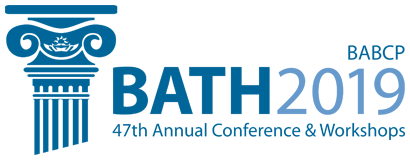
by Staff writer
Alastair Barrie refines practice with BABCP
Following on from our previous blog on the topic, we have more news to announce concerning our recent representation at an industry convention. Last week, Cognitive Behavioural Therapist Alastair Barrie visited the University of Bath for the British Association of Behavioural and Cognitive Psychotherapists’ annual conference, where he presented his MSc dissertation thesis on refining practice within trauma recovery programmes.
Alastair has since returned from the event and shared his insights on the experience, which included a variety of academic networking and professional development opportunities. One of these opportunities was a round table seminar, in which Alastair was invited to participate in discussion with other clinicians on the use of best practice when seeking to support clients suffering from complex trauma.
These cases typically concern individuals who have suffered from extended periods of adverse experiences, often during their early stages of cognitive development. As such, it is necessary to take into account multiple contributing factors that would influence their needs and anticipate how a proper therapeutic approach might differ from the standardised, textbook methods of treatment as a result.
Unsurprisingly, this seminar became very relevant within the context of Alastair’s study, in which he queried which methods of trauma recovery treatment can be observed to be most effective for clients whose Post Traumatic Stress Disorder symptoms have been caused by different kinds of traumatic circumstances. It is similarly cohesive with the principles of trauma-informed care that we are keen to practice at JSA.

There was also an aspect of the discussion that Alastair found particularly insightful, in which the group explored means of discerning a client’s current strengths and reframing them in a way that allows the therapist to harness the positive potential of extant beliefs and behaviours. He has found this methodology extremely valuable and is looking forward to incorporating it more actively into his own practice.
Later in the day, he was able to attend a workshop for therapists on how best to practice managing your emotional reactions and responses to certain antagonistic issues that a client may bring to the session. Discussion focused on methods of remaining focused on the client’s needs, an essential component of the therapeutic relationship that defines it against other forms of emotional support.
Alastair found many opportunities to engage with specialists from the organisation who were able to shed some light on more advanced elements of Schema therapy techniques. He has been spending lots of time working on professional development in this framework over the last year and managed to speak to several industry experts on the panel in order to gain recommendations for more focused further reading. He has also been signposted towards some excellent resources for exploring the use of Dialectical Behaviour Therapy, another model that he seeks to adopt into his working model.
In terms of next steps, Alastair currently plans to submit his study to academic journals in the hopes of getting it published, but in the meantime, he intends to focus much more on his clinical work and refine his practice through hands- on professional development.


